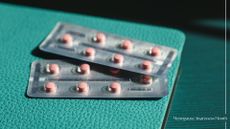Menopause
A menopause information hub. Find out about the different symptoms (including hot flushes, night sweats, loss of libido, weight gain) and how to manage them
Latest
-

'My fan came out at every meeting' - 3 women on how they stopped menopause derailing their career
Menopause doesn't have to change the way you work, unless you want it to
By Kerry Law Published
-

What are the main menopause symptoms? Find out the signs and when to see your doctor
A team of experts outline common menopause symptoms and how to deal with them
By Grace Walsh Last updated
-

What is anhedonia? The menopause symptom you've probably never heard of
Feeling underwhelmed by life could mean you’re experiencing anhedonia, but all is not lost
By Debra Waters Published
-

Perimenopause fatigue can be 'overwhelming' - here's how to deal with it
Symptoms like disrupted sleep, mood swings, and low vitamin levels go hand-in-hand, creating the perfect cocktail for perimenopause fatigue
By Ali Horsfall Published
-

Quiz of the Day: It's Menopause Awareness Month - test your knowledge on the facts
Put your knowledge of the change to the test and see if you know the facts from the myths
By Caitlin Elliott Published
-

The pros and cons of HRT - and all you need to know about hormone replacement therapy
There are pros and cons of HRT, just like anything else. Here, the doctors reveal what you need to know before making a decision
By Grace Walsh Last updated
-

What are the symptoms of perimenopause? 11 to speak to your doctor about
Growing knowledge of menopause means we're talking about it more than ever before - but what about the symptoms of perimenopause?
By Grace Walsh Last updated
-

“Doctors thought I had dementia, but it was actually the perimenopause”
Katie had to endure four years of exhaustion and low moods until she finally found the right answer
By Kathryn Lewsey Published
-

"We needed to make menopause the new vegan" says MTick founder, confessing she was "totally unprepared for perimenopause"
Heather Jackson tells us how and why she co-created the MTick – a shopping symbol for menopause-friendly products
By Kathryn Lewsey Published
